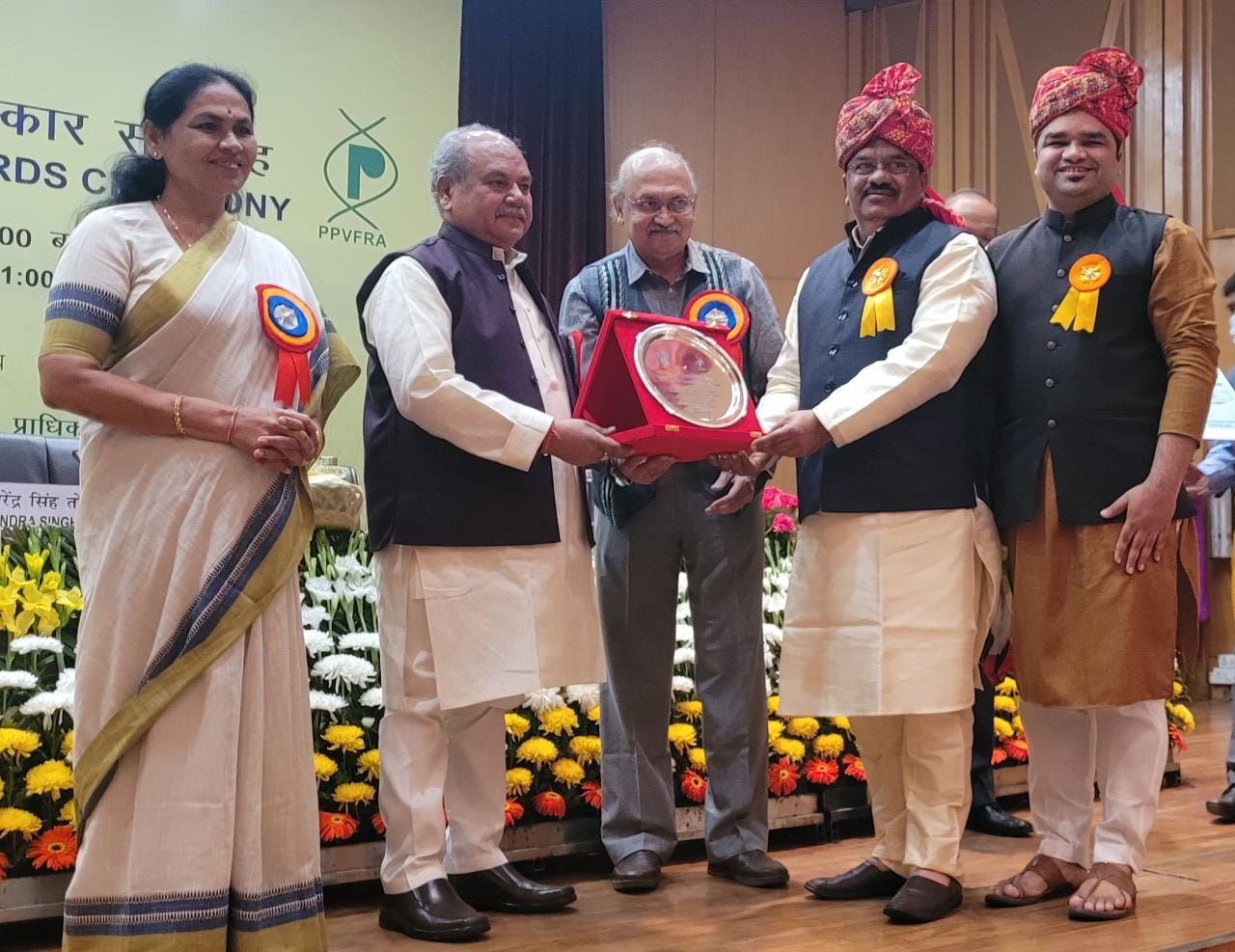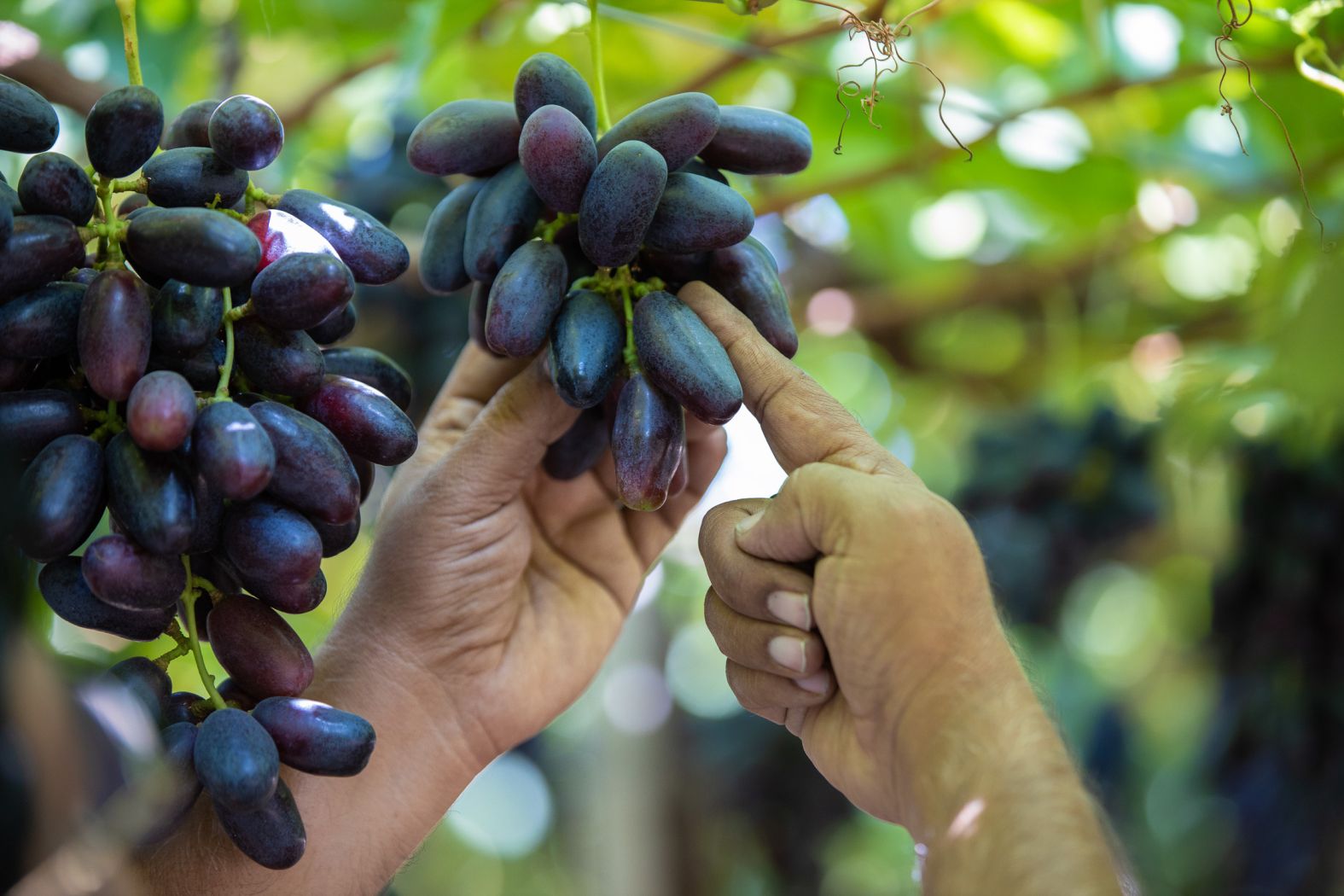Developing new grape varieties has become a common practice among farmers of the grape growing belt in Maharashtra.
Over the years, varieties from the Vitis Vinifera have attracted the attention of farmer breeders and so far there are around a dozen new varieties developed by farmers belonging to the grape-growing belt of Maharashtra. Among the earliest farmer breeder varieties is Tas Ganesh, developed by Subash Arve (1970), followed by Solapur’s Manik Chaman by T R Dabade (1982), Maruti Seedless by Sangli’s Maruti Ramchandra Mali (1994), Mahadev Seedless by Solapur’s Gausmohammed Saipan Shaikh (2007) and Sudhakar Seedless by Nashik’s Sudhakar Kshirsagar (2019). Other varieties grown include Red Globe, Krishna Seedless, Sharad Seedless, Fantasy Seedless, Crimson Seedless etc. Varieties developed by Pune-based ICAR-National Research Centre for Grapes, namely Manjari Shyama, Manjari Naveen and Manjari Medika too are cultivated by scores of farmers.
Most growers in the State are members of GrapeNet, a web-based certification and traceability software system which monitors fresh grapes exported from India to the European Union. It helps track all the details of the consignment, right down to the location of the vineyards, record of all the processes involved which can be traced by international customers at the end of the chain to validate the authenticity and quality of the grapes.
However, Dattaraya N Kale of Solapur stands apart having developed five new varieties over the years. Most of them have found acceptance not among growers in their home state but also among those in Karnataka, Tamil Nadu, Telangana and Andhra Pradesh.
The 56-year-old’s latest variety called King Berry, launched this February, has attracted a lot of attention due to its size. An elongated variety, which is black and purple in colour has an astounding berry length of 45-50mm and width (berry diameter) of 24-25mm, making it suitable for making premium raisins. Its size is relatively big considering the berry length of those produced in India that vary between 12mm to 20mm. Its closest rival is Super Sonaka, a white-coloured table grape that reaches a length of 25mm.
Kale’s Sonaka Farms in Nanaj, spread over 25 acres, has so far developed six unique varieties of grapes.
A Family of Grape Innovators

It all began in 1980, when Dattatraya’s father, Nanasaheb, considered a pioneer in grape farming, introduced Sonaka Seedless, arguably the country’s first elongated green grape. Widely popular in the domestic market, it created history and inspired many new grape varieties. The variety opened new markets, like China and HK to Indian grape growers.
Ten years later, Dattaraya, then 31, launched Sharad Seedless, a black variety which is one of the top varieties grown in India and followed it in 2004 by introducing Sarita Seedless — named after his mother. Reminiscing about his first innovation, Kale says, “I observed that bunches in one particular clone of Sharad Seedless vine had many bigger-sized berries. I monitored it closely for three years and realised the clone was different and distinctive from the rest.”
A progressive grape grower who discontinued his education after his Class 12, Kale has followed the footsteps of his father and owns 25 acres of vineyards and grows various varieties developed by his family. He has started a nursery to sell the grafts of his seedless grape varieties and is also involved in producing and selling black raisins prepared from the Sarita and Nanasaheb Purple Seedless varieties.
Kale was given the Plant Genome Saviour Farmer Award (2018-19) which carries a cash award of Rs 1.50 lakhs for his outstanding contribution in developing improved grape varieties by the Union Agriculture Minister at an event held in New Delhi.
This February, keeping social distancing norms in place, he introduced the King Berry to grape growers, with former Agriculture Minister Shard Pawar present in his vineyard at Nanaj.
Every branch of this variety has at least two to three bunches. He has successfully produced 11 tonnes per acre in the first year and followed it with 14 tonnes in the second year. Says Kale, “King Berry is likely to address new export markets, namely China, Hong Kong and Malaysia. It is high yielding, weather-resistant and fetches higher prices in the market,” says Kale, a recipient of Grass Root Innovation Award at Festival of Innovation and Entrepreneurship (FINE) 2019 — the country’s flagship initiative towards recognising and rewarding the creativity of the common man.
As the variety produces high-quality raisins growers have the alternative to fresh grapes. As branded raisin, it attracts a premium price due to its size.
While export gives him between Rs 165 and Rs 170 per kg, local sales give him Rs 80 a kg, and the King Berry raisins command a price of Rs 600 per kg.

He has developed five varieties, of which three are registered with the National Innovation Foundation while the other two, namely King Berry and Danaka Purple Seedless, are under process.
According to Dr R G Somkuwar, Director (Acting) of ICAR-National Research Centre for Grapes (NRCG) the Kale family’s contributions towards developing new varieties is exemplary and is being cultivated widely. “The new variety, King Berry, holds a lot of promise for growers from what I have learnt,” he adds.
A serial farmer-breeder, Kale has set up a nursery to sell the grafts of his developed grape varieties. “We prepare the grafts with immense care and precaution so that survival rate is close to 100% and fruiting starts at the right time. As grafting needs good humidity we use foggers to create the desired humidity in the nursery,” he informs.
Among his innovative varieties Sarita Seedless and Nanasaheb Purple Seedless have been widely adopted by the growers for profitable cultivation due to their good berry length, taste, attractive purple coloured and litchi flavoured big sized berries.
The variety Nanasaheb Purple Seedless has been disseminated in four states, namely Maharashtra, Andhra Pradesh, Madhya Pradesh and Karnataka covering more than 21,000 hectares area. It also covers 90 per cent of grape cultivation in Maharashtra. Sarita Seedless is widely cultivated in Solapur and Nashik areas of Maharashtra covering over 17,000 hectares.
Thanks to King Berry’s acceptance in the market as raisins, Kale has plans to shift to raisin production on a large scale. “The future of grapes is in adding value and raisins have great potential. Processing grapes into raisins gives a good option to farmers in case of market instabilities,” says Kale, who has already tied up with neighbouring farmers to brand their product and sell it in cities of Pune and Mumbai.
(Edited by Yoshita Rao)
No comments:
Post a Comment